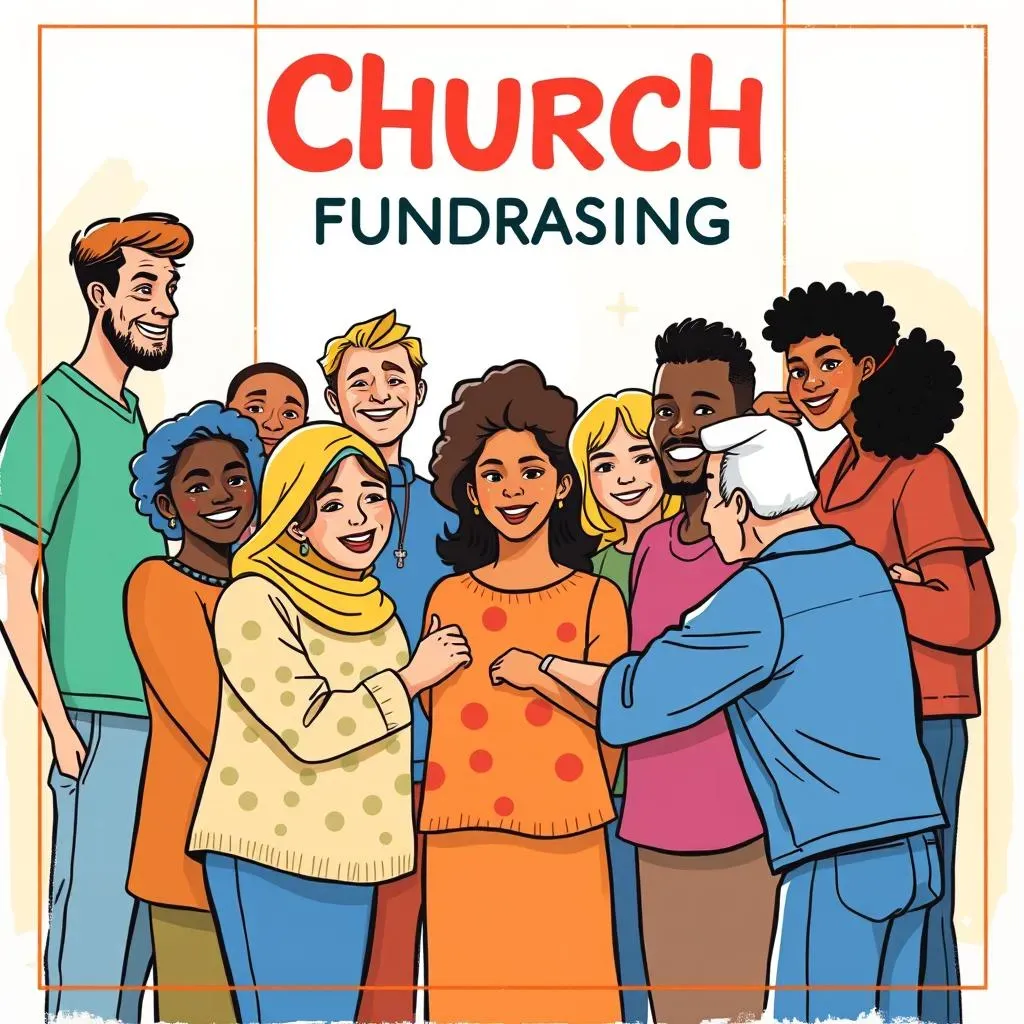Table of Contents
Running a successful church fundraiser requires more than just a great idea; it needs effective promotion to reach your community and inspire generosity. This comprehensive guide tackles the crucial question: How to promote church fundraisers. We'll explore a range of strategies, from traditional methods to leveraging the power of digital platforms. Learn how to craft compelling messages that resonate with your congregation and the wider community. Discover creative and engaging ways to make your fundraising efforts stand out, attracting new donors and encouraging repeat contributions. We’ll also delve into practical tips for maximizing your reach through social media, email marketing, and other digital tools. Finally, we'll show you how to measure the effectiveness of your promotional efforts and refine your strategies for future success. Get ready to transform your fundraising approach and unlock the potential for greater financial support for your church's vital ministries.
Effective Strategies to Promote Church Fundraisers
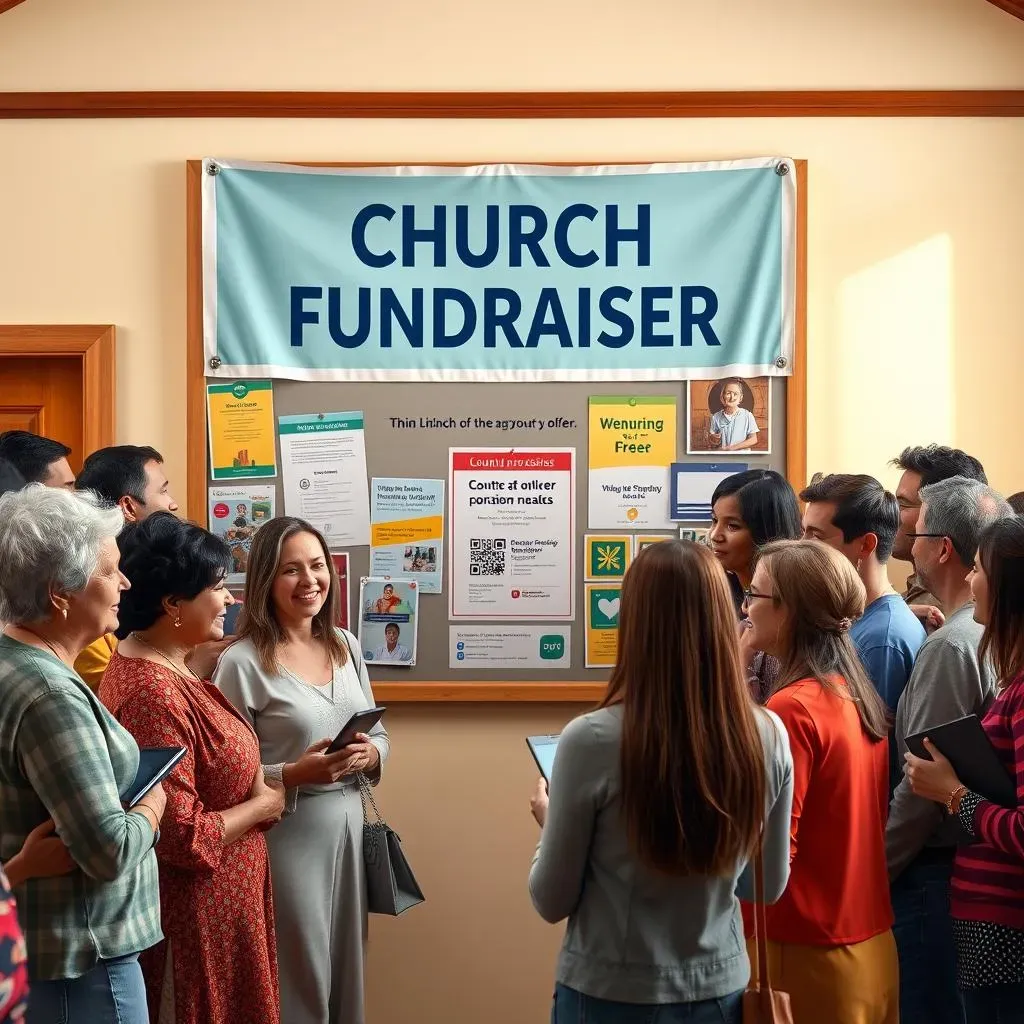
Effective Strategies to Promote Church Fundraisers
Harnessing the Power of Word-of-Mouth
Word-of-mouth remains a surprisingly powerful tool. Enthusiastic church members are your best ambassadors. Encourage them to spread the word among their friends, family, and colleagues. Share compelling stories about the impact of your church's work and how the fundraiser will directly help. A personal touch often resonates more deeply than formal announcements. Think about creating short, shareable videos or testimonials that capture the essence of your fundraiser and its importance. These can be easily shared on social media, and through email.
Consider organizing a small launch event to generate initial buzz. This could be an informal gathering where you share information about the fundraiser and its goals with key members of your congregation. This early engagement can lay the groundwork for a successful campaign by getting people excited and involved from the start. For more ideas on how to engage your community, check out our guide on engaging the community.
Method | Pros | Cons |
|---|---|---|
Personal Conversations | Authentic, builds relationships | Limited reach, time-consuming |
Social Media Sharing | Wide reach, visual appeal | Requires active management |
Utilizing Traditional Marketing Techniques
While digital marketing is vital, don't underestimate the power of traditional methods. Well-designed flyers and posters placed strategically around your community can still attract attention. Consider partnering with local businesses to display your promotional materials in their stores or offices. A professionally designed church bulletin insert can reach your entire congregation every week. Consider adding a QR code linking to your online donation page for easy access. Don't forget the classic fundraising letter! A heartfelt, well-written letter can be surprisingly effective, especially when personalized.
Think about the demographics of your community. If you have a largely older population, a direct mail campaign might be more effective than relying solely on social media. If your target audience is younger, consider using more visually appealing materials and promoting the event on platforms they use most. For tips on writing effective fundraising letters, check out our post on writing fundraising letters.
- Flyers and Posters
- Bulletin Inserts
- Direct Mail Letters
- Local Business Partnerships
Leveraging Digital Platforms for Church Fundraiser Promotion
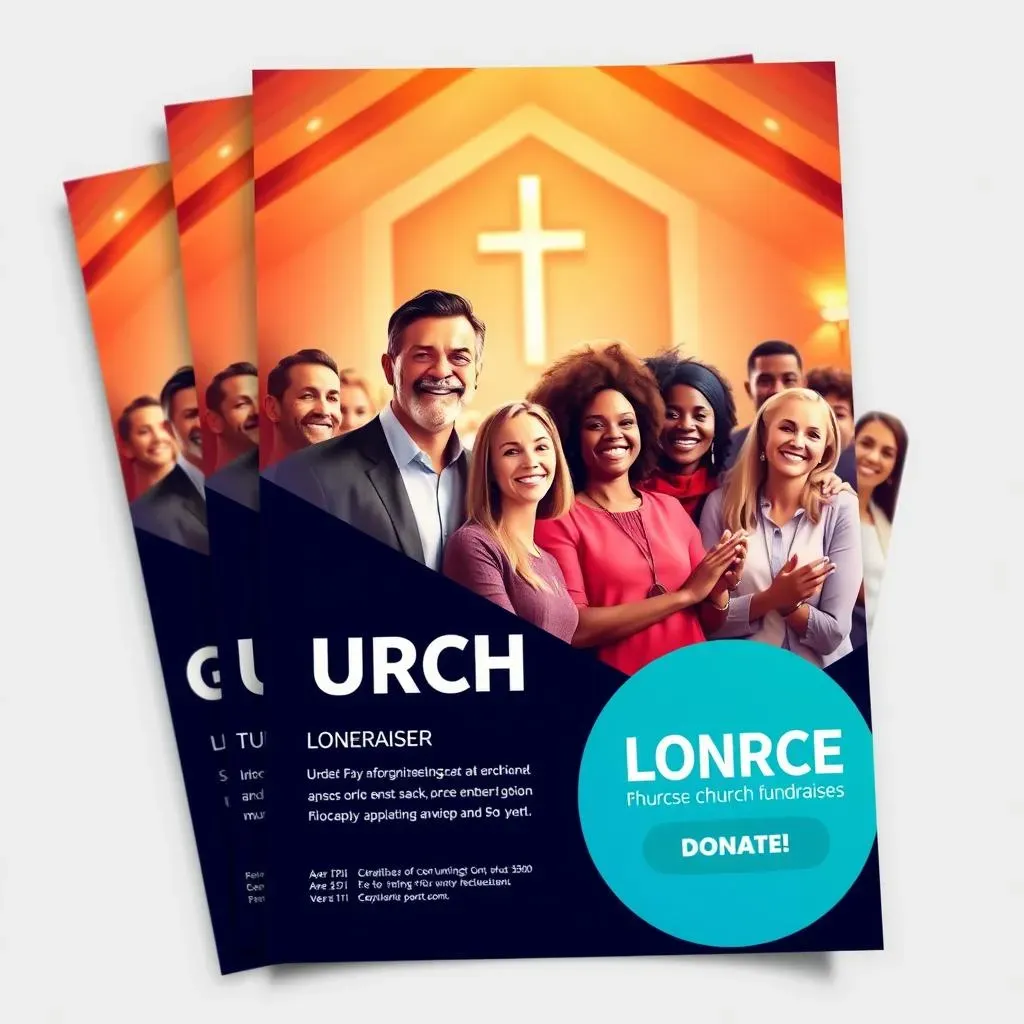
Leveraging Digital Platforms for Church Fundraiser Promotion
The digital world offers incredible opportunities to promote your church fundraisers. A well-designed website is your central hub. Make sure it's easy to navigate, visually appealing, and clearly outlines your fundraiser's purpose, goals, and how donations will be used. Include high-quality photos and videos to showcase your church's work and the impact of donations. A dedicated donation page should be prominently featured, making it simple for people to contribute online. Consider using a platform like online church fundraising platforms to simplify the process.
Social media is your megaphone. Create engaging posts with compelling visuals and stories about your fundraiser. Use relevant hashtags to increase visibility. Run contests or giveaways to boost engagement. Consider using Facebook or Instagram stories for behind-the-scenes glimpses into your preparations. Don't forget to encourage your congregation to share your posts with their networks. For more detailed tips, see our guide on using social media for church fundraising.
- Website with dedicated donation page
- Social media campaigns (Facebook, Instagram, etc.)
- Email marketing
- Online advertising (if budget allows)
Email marketing remains a powerful tool. Build an email list and send regular updates about your fundraiser's progress. Share inspiring stories and photos. Include clear calls to action, making it easy for people to donate. Segment your email list to target specific groups within your congregation or community with tailored messages. Personalize your emails whenever possible for a more impactful approach. Remember to always comply with relevant data privacy regulations.
Consider using online advertising if you have a budget. Platforms like Google Ads and social media advertising allow you to target specific demographics within your community. Create compelling ad copy and visuals that highlight the urgency and impact of your fundraiser. Track your ad performance carefully and adjust your strategy as needed. Remember to set a realistic budget and track your return on investment (ROI) to ensure your advertising efforts are cost-effective. For inspiration, look at our church fundraising success stories.
Platform | Strengths | Weaknesses |
|---|---|---|
Website | Central hub, detailed information | Requires technical skills/resources |
Social Media | Wide reach, visual engagement | Algorithm changes, requires active management |
Email Marketing | Targeted messaging, personal touch | Requires email list building |
Creative and Engaging Ways to Promote Church Fundraisers
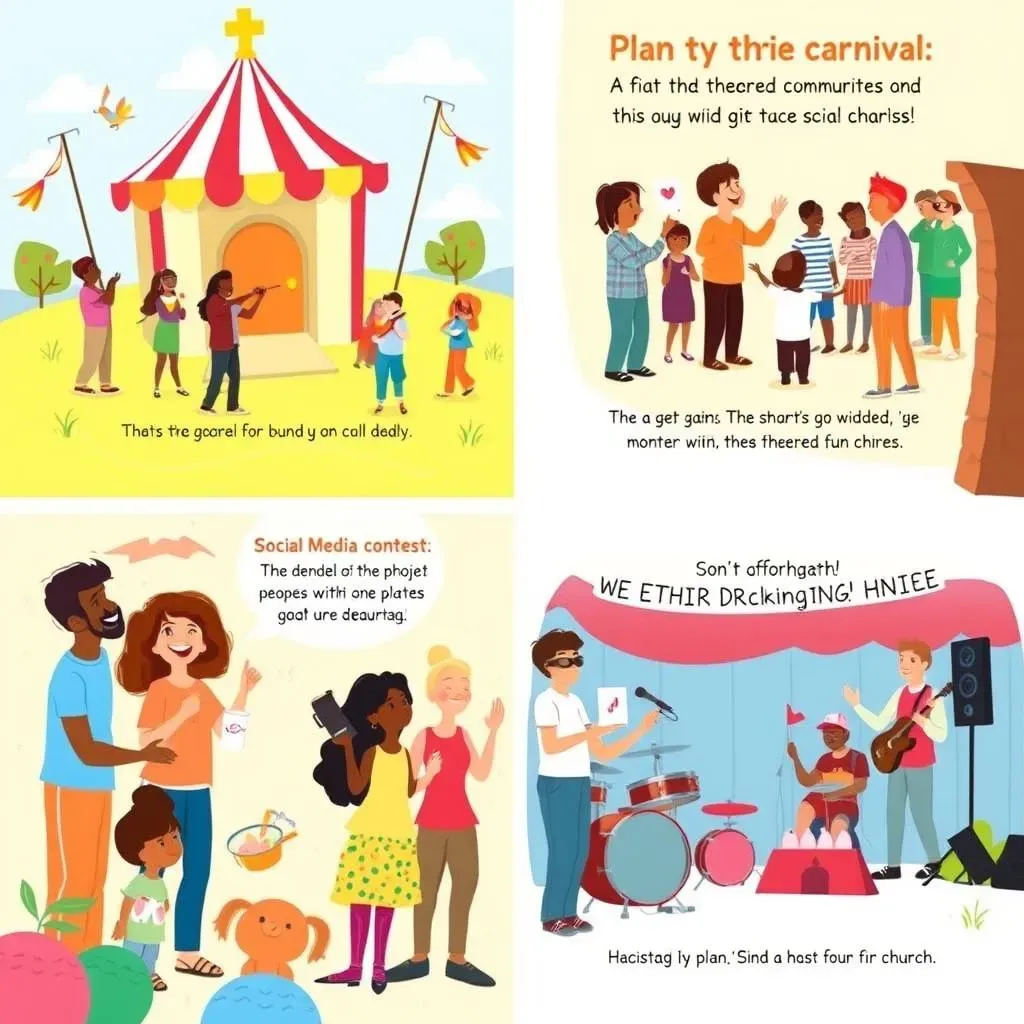
Creative and Engaging Ways to Promote Church Fundraisers
Let's ditch the boring announcements and embrace creativity! Think beyond flyers – how about a fun video showcasing church members sharing their excitement for the fundraiser? Or a photo contest on Instagram, encouraging people to share pictures related to the fundraiser's theme? These approaches make the event feel less like an obligation and more like a community celebration. Remember to keep the tone light and engaging; you want people to feel excited, not burdened.
Consider a themed event! A "Taste of Nations" dinner, a retro dance, or a family-friendly carnival can draw a bigger crowd than a standard bake sale. These events offer something unique and memorable, making them more shareable on social media. Don't forget to highlight the fun and festive aspects in your promotional materials. For ideas on unique fundraising events, check out our page on innovative fundraising ideas.
- Themed Events
- Contests and Giveaways
- Interactive Social Media Campaigns
- Partnering with Local Artists/Musicians
Partnering with local artists or musicians can add a unique touch. A local band playing at your event, or an art exhibition featuring works from church members, can create a buzz and attract a broader audience. Make sure the partnership aligns with your church's values and the overall tone of your fundraiser. Highlight the collaboration in your promotional materials to emphasize the community aspect of your event. This can be a fantastic way to showcase local talent and build bridges within your community.
Don't underestimate the power of storytelling! Share personal stories of how your church's work has impacted lives. These narratives can resonate deeply with potential donors and inspire them to contribute. Use testimonials, videos, or even short written pieces to highlight the positive impact of your fundraising efforts. For more ideas on storytelling, check out our church fundraising success stories.
Idea | Impact | Effort Level |
|---|---|---|
Video Campaign | High engagement | Medium |
Themed Event | Broader appeal | High |
Local Partnerships | Community building | Medium |
Storytelling | Emotional connection | Low |
Measuring the Success of Your Church Fundraiser Promotion
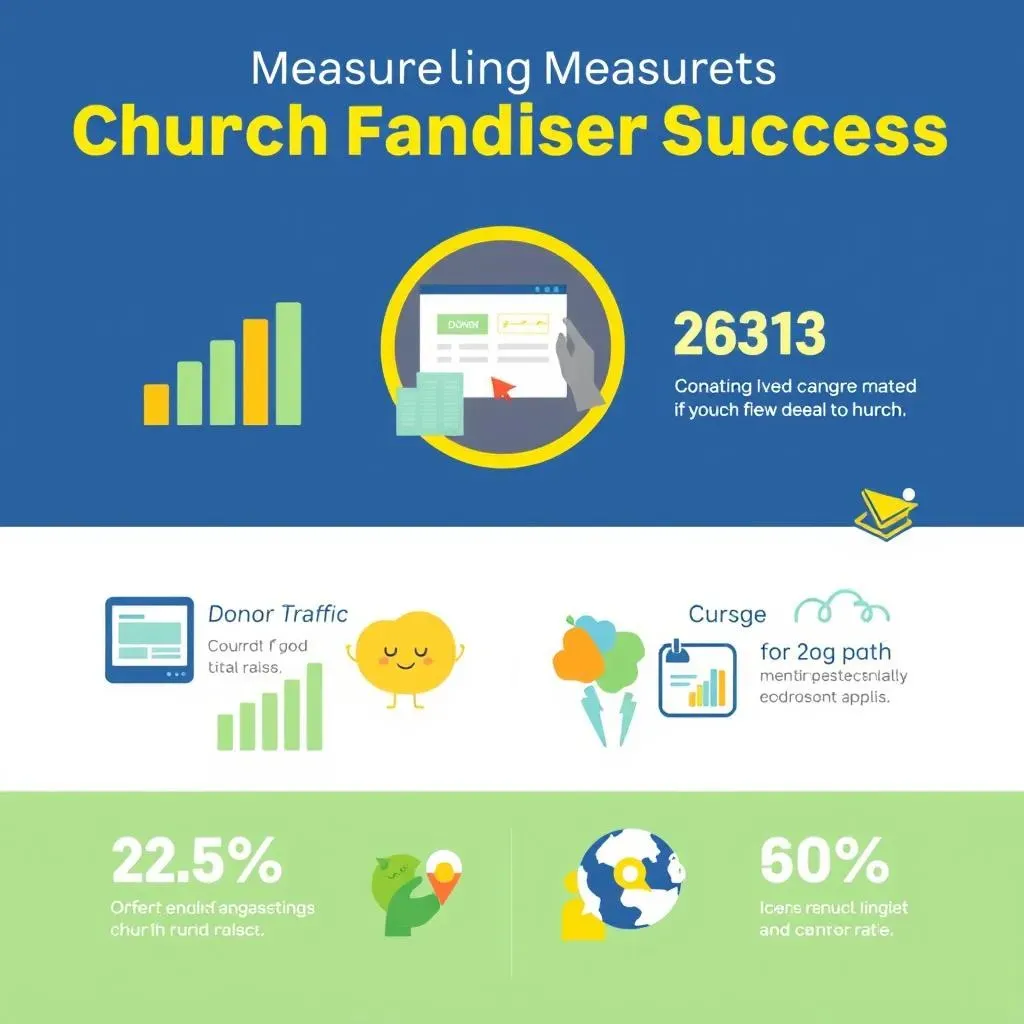
Measuring the Success of Your Church Fundraiser Promotion
Tracking Key Metrics
Don't just hope for the best; measure your progress! Start by setting clear, measurable goals *before* your fundraiser begins. How much money do you hope to raise? How many people do you want to reach? Tracking these metrics throughout your campaign provides valuable insights. Use a spreadsheet or a dedicated fundraising platform to monitor your progress. Pay close attention to your online donation page. How many visits does it receive? What's your conversion rate (the percentage of visitors who actually donate)? This data is crucial for understanding the effectiveness of your online promotional efforts. For more FAQ's about church fundraising, see our church fundraising FAQs.
Social media analytics are your friend. Most platforms provide detailed data on post reach, engagement, and website clicks. This information helps you understand which types of content resonate most with your audience and refine your strategy accordingly. Are your posts getting lots of likes but few donations? You might need to adjust your call to action. Are you seeing high website traffic from a specific social media platform? Focus your efforts there. For more tips, check out our guide on using social media for fundraising.
- Total funds raised
- Number of donors
- Website traffic and conversion rates
- Social media engagement
Analyzing Your Results
Once your fundraiser concludes, it's time for a post-mortem. Compare your actual results to your initial goals. Did you meet your fundraising target? If not, why not? Analyze the data you've collected. Which promotional channels were most effective? Which ones fell flat? What was the average donation amount? Were there any unexpected trends or patterns in your data? Understanding these factors is critical for planning future fundraisers. For examples of successful campaigns, check out our church fundraising success stories.
Consider gathering feedback from your donors. A simple survey, either online or through a feedback box at your event, can provide valuable insights into what resonated with them and what could be improved. Did they find your promotional materials clear and engaging? Was the donation process easy? What motivated them to contribute? This qualitative data complements your quantitative data, providing a more complete picture of your campaign's success.
Metric | Analysis | Actionable Insight |
|---|---|---|
Donation Amount | Average donation, highest/lowest | Adjust pricing/donation tiers |
Donor Acquisition | New vs. returning donors | Refine outreach strategies |
Channel Performance | Website, social media, email | Allocate resources effectively |
Improving Future Campaigns
The real value of measuring your success lies in using the data to improve your future fundraisers. Based on your analysis, refine your strategies. Did your social media campaign underperform? Experiment with different content formats, posting times, or hashtags. Did your email marketing fall short? Try segmenting your list more effectively or personalizing your messages. Did your website receive high traffic but low conversions? Improve the design, navigation, or call to action on your donation page. For more ideas on planning your next event, check out our church fundraising event planning guide.
Don't be afraid to experiment! Try different approaches and track the results. What works for one fundraiser might not work for another. Continuously analyze your data and adapt your strategies based on what you learn. Remember, fundraising is an ongoing process. By consistently learning and improving, your church can maximize its fundraising potential and achieve its goals. For more ideas on making your next fundraiser a success, check out our post on best practices for church fundraising campaigns.
- Refine marketing materials
- Optimize donation process
- Experiment with new channels
- A/B test different messaging
